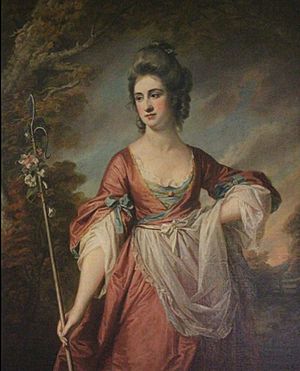Philip Yorke (antiquary) facts for kids
Quick facts for kids
Philip Yorke
|
|
|---|---|
| Born | 30 July 1743 "Erddig Hall," Denbighshire, Wales |
| Died | 19 March 1804 "Erddig Hall," Denbighshire, Wales |
| Resting place | Church of St. Deiniol and St. Marcella, Marchwiel, Denbighshire, Wales |
| Language | English |
| Genre | Welsh genealogical history |
| Notable works | The Royal Tribes of Wales (1799) |
| Spouse | Elizabeth Cust (d. 1779) and Diana Wynne (d. 1805) |
| Children | Simon Yorke (1771–1834) Ethelred Yorke (1772–1796) |
| Relatives | Simon and Dorothy Yorke (parents); Philip Yorke, first earl of Hardwicke |
Philip Yorke (born July 30, 1743 – died February 19, 1804) was a Welsh politician. He served in the House of Commons, which is like a part of the government, from 1775 to 1792. He was also an antiquary, meaning he was very interested in old things, especially Welsh history and genealogy (the study of family trees). Later in his life, he became famous for writing a book called The Royal Tribes of Wales (1799).
Contents
Early Life and Education
Philip Yorke was born at Erddig, near Wrexham in Wales. His parents were Simon Yorke and Dorothy Hutton. His family was related to important people, including Philip Yorke, 1st Earl of Hardwicke, who was a very influential figure.
Philip went to school in Wanstead and Hackney. After that, he studied at Eton College, a well-known school. In 1762, he went to Benet College, Cambridge, where he earned a master's degree in 1765. He also studied law at Lincoln's Inn and became a lawyer in 1767. Philip loved reading classic books and became a member of the Society of Antiquaries of London in 1768. This group studied ancient times and historical objects.
Family and Political Career
Philip Yorke married his first wife, Elizabeth Cust, on July 2, 1770. They had seven children together. In 1775, Philip became a Member of Parliament (MP) for Helston. This meant he represented that area in the House of Commons. Elizabeth passed away in 1779.
Philip married his second wife, Diana Meyrick, in 1782. She was a widow and had four sons and two daughters with Philip. Philip was a country gentleman who cared more about farming and history than politics. He was known for being honest and independent. From 1786 to 1787, he served as the High Sheriff of Denbighshire, a local official responsible for law and order.
In 1792, he became an MP for Grantham. He held this seat until his son, Simon Yorke, was old enough to take over. Philip was a quiet person and did not often speak in Parliament.
Interest in Welsh History
Philip Yorke's second marriage sparked a deep interest in Welsh history and family trees. He began to research his wife's ancestors, who were from an old Welsh family. He became very passionate about Welsh history.
In 1795, he published his first book on Welsh history and genealogy, called Tracts of Powys. This book explored the history of important Welsh families. It also defended early Britons against negative views.
His most famous work, The Royal Tribes of Wales, was published in 1799. This book focused on the main royal families of Wales and their descendants. Philip initially believed in old stories about the Welsh people coming from ancient Trojan heroes, but he later changed his mind about these theories. He also started working on another history book, but he did not finish it before he died.
Later Life and Legacy
Philip Yorke passed away on February 19, 1804, at the age of 60. His wife, Diana, died the following year. He is remembered as a great conversationalist and storyteller. He also enjoyed acting in plays as a hobby.
There is a special memorial for him at the Church of St Deiniol and St Marcella in Marchwiel, Wales. It honors his honesty, kind manners, and intelligence.
Works
- Tracts of Powys (1795)
- The Royal Tribes of Wales (1799)
 | Leon Lynch |
 | Milton P. Webster |
 | Ferdinand Smith |


